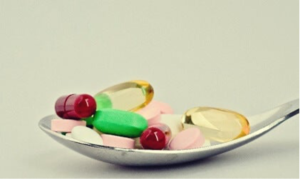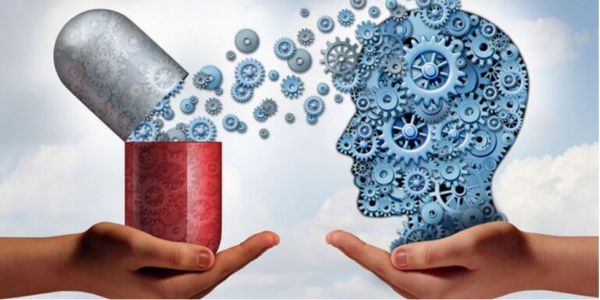Self-Medication with Psychopharmaceuticals


Written and verified by the psychologist Valeria Sabater
Self-medication with psychopharmaceuticals is becoming more and more common. In fact, although they’re prescribed by doctors, many people turn to other ways to get hold of them. This is because they need them to relieve pain, help them sleep, or calm the anxiety that makes it difficult for them to function in the daytime.
When it comes to self-medication, there’s no doubt that the main problem is the use and abuse of anti-anxiety medications. If you choose to go down this route without having a prescription from a medical professional, you’ll end up suffering a boomerang effect and very unfortunate circumstances. Because, while it’s true that the drugs provide relief at first, you’ll eventually need a higher dose to get the same effect.
Then, almost without noticing it, you could develop a serious addiction. Furthermore, in many cases, these psychopharmaceuticals can interact with other medications you’re taking. This increases the risk of you suffering a heart attack or even dying.
Self-medication in young people
Self-medication is certainly not an insignificant problem. Furthermore, clinical studies suggest that young people are the most likely segment of the population to self-medicate with psychopharmaceuticals.
In fact, young people are increasingly turning to self-medication to treat symptoms of anxiety, depression, or insomnia. In addition, in many cases, they combine these drugs with alcohol. This practice has serious health consequences.

What’s self-medication with psychopharmaceuticals?
Self-medicating is using and consuming medicines without a prescription. This practice is quite common. For example, you do it when you take a painkiller for a headache.
According to the World Health Organization (WHO), self -medication is an ever-increasing phenomenon. They also suggest it needs to be addressed with adequate health education. These are the most common drugs people self-medicate with:
- Antibiotics. You must remember that misusing antibiotics means that, when you really need them, they won’t work properly.
- Opioid painkillers. For example, codeine, tramadol, morphine, or methadone.
- Psychotropic drugs. They’re used to treat psychotic and bipolar disorders, sleep problems, depressive disorders, obsessive-compulsive disorders, and panic crises, among others. The most common psychotropic drugs are benzodiazepines.
Why do people resort to self-medication with psychopharmaceuticals?
There are multiple reasons why someone might resort to self-medication with psychopharmaceuticals. A study conducted at the University of Michigan by Dr. Katherine Harris and Dr. Mark Edlund suggests that a good proportion of these people resort to self-medication after undergoing medical treatment that they feel hasn’t worked.
Hence, instead of asking for professional help once more, you might go down other avenues, like self-medication. However, there might also be other triggers for this kind of behavior.
- You may have relatives who are being treated for depression or anxiety disorder. You might then find yourself identifying with the same symptoms. Thus, without taking any medical advice, you decide to self-medicate.
- Certain young people might see it as a social and recreational practice. They might also use alcohol, marijuana, and some psychotropic drugs.

How do you get a drug without a prescription?
Psychopharmaceuticals, like many other drugs, are only available with a prescription. So, how do you get hold of them without one?
- Through family members who do have prescriptions.
- Buying them off the Internet, on the street, or from someone that sells them illegally.
- Having contacts in health institutions like hospitals or clinics.
Effects of self-medication with psychopharmaceuticals
The Nordic Cochrane Centre is a nonprofit organization with a very noble cause. At this institution, scientists from all around the world rigorously analyze and review medicines and other health products to check their safety and effectiveness. Indeed, they go above and beyond the studies drug manufacturers conduct.
One thing that they point out, and that should really make you think, is that the abuse and misuse of psychopharmaceuticals cause more than 50,000 deaths per year. Indeed, self-medication with psychopharmaceuticals often ends in death. The reasons for this are:
- Self-medication with these types of drugs often leads to you becoming dependent upon them.
- The biggest risk is when the drugs interact with other substances. For example, the combination of benzodiazepines with alcohol can be dangerous. However, effects can even be fatal when the self-medicating drugs interact with other drugs you’re taking.
Symptoms
The effects of self-medication with psychopharmaceuticals depend on the type of medication you’re taking. However, the most common effects are the following:
- Drowsiness.
- Muscle stiffness.
- Tremors.
- Depression.
- Dry mouth.
- Constipation.
- Blurred vision.
- Heart problems, such as tachycardia.
- Allergic relations.
- Disruption of the menstrual cycle.
- Sexual dysfunction.
- Restless legs syndrome.

One fact is obvious. If you resort to self-medication to relieve anxiety, sadness, or any other personal problem, in the short term, your symptoms will intensify. Furthermore, other psychological symptoms such as psychosis or mental confusion might appear.
As you can see, resorting to self-medication is never a good idea. In fact, it could cost you your life. No drug is harmless. Furthermore, drugs that are intended for the treatment of mental conditions often cause more harm than others. You must always be careful. In addition, you must always take the advice of medical professionals.
Self-medication with psychopharmaceuticals is becoming more and more common. In fact, although they’re prescribed by doctors, many people turn to other ways to get hold of them. This is because they need them to relieve pain, help them sleep, or calm the anxiety that makes it difficult for them to function in the daytime.
When it comes to self-medication, there’s no doubt that the main problem is the use and abuse of anti-anxiety medications. If you choose to go down this route without having a prescription from a medical professional, you’ll end up suffering a boomerang effect and very unfortunate circumstances. Because, while it’s true that the drugs provide relief at first, you’ll eventually need a higher dose to get the same effect.
Then, almost without noticing it, you could develop a serious addiction. Furthermore, in many cases, these psychopharmaceuticals can interact with other medications you’re taking. This increases the risk of you suffering a heart attack or even dying.
Self-medication in young people
Self-medication is certainly not an insignificant problem. Furthermore, clinical studies suggest that young people are the most likely segment of the population to self-medicate with psychopharmaceuticals.
In fact, young people are increasingly turning to self-medication to treat symptoms of anxiety, depression, or insomnia. In addition, in many cases, they combine these drugs with alcohol. This practice has serious health consequences.

What’s self-medication with psychopharmaceuticals?
Self-medicating is using and consuming medicines without a prescription. This practice is quite common. For example, you do it when you take a painkiller for a headache.
According to the World Health Organization (WHO), self -medication is an ever-increasing phenomenon. They also suggest it needs to be addressed with adequate health education. These are the most common drugs people self-medicate with:
- Antibiotics. You must remember that misusing antibiotics means that, when you really need them, they won’t work properly.
- Opioid painkillers. For example, codeine, tramadol, morphine, or methadone.
- Psychotropic drugs. They’re used to treat psychotic and bipolar disorders, sleep problems, depressive disorders, obsessive-compulsive disorders, and panic crises, among others. The most common psychotropic drugs are benzodiazepines.
Why do people resort to self-medication with psychopharmaceuticals?
There are multiple reasons why someone might resort to self-medication with psychopharmaceuticals. A study conducted at the University of Michigan by Dr. Katherine Harris and Dr. Mark Edlund suggests that a good proportion of these people resort to self-medication after undergoing medical treatment that they feel hasn’t worked.
Hence, instead of asking for professional help once more, you might go down other avenues, like self-medication. However, there might also be other triggers for this kind of behavior.
- You may have relatives who are being treated for depression or anxiety disorder. You might then find yourself identifying with the same symptoms. Thus, without taking any medical advice, you decide to self-medicate.
- Certain young people might see it as a social and recreational practice. They might also use alcohol, marijuana, and some psychotropic drugs.

How do you get a drug without a prescription?
Psychopharmaceuticals, like many other drugs, are only available with a prescription. So, how do you get hold of them without one?
- Through family members who do have prescriptions.
- Buying them off the Internet, on the street, or from someone that sells them illegally.
- Having contacts in health institutions like hospitals or clinics.
Effects of self-medication with psychopharmaceuticals
The Nordic Cochrane Centre is a nonprofit organization with a very noble cause. At this institution, scientists from all around the world rigorously analyze and review medicines and other health products to check their safety and effectiveness. Indeed, they go above and beyond the studies drug manufacturers conduct.
One thing that they point out, and that should really make you think, is that the abuse and misuse of psychopharmaceuticals cause more than 50,000 deaths per year. Indeed, self-medication with psychopharmaceuticals often ends in death. The reasons for this are:
- Self-medication with these types of drugs often leads to you becoming dependent upon them.
- The biggest risk is when the drugs interact with other substances. For example, the combination of benzodiazepines with alcohol can be dangerous. However, effects can even be fatal when the self-medicating drugs interact with other drugs you’re taking.
Symptoms
The effects of self-medication with psychopharmaceuticals depend on the type of medication you’re taking. However, the most common effects are the following:
- Drowsiness.
- Muscle stiffness.
- Tremors.
- Depression.
- Dry mouth.
- Constipation.
- Blurred vision.
- Heart problems, such as tachycardia.
- Allergic relations.
- Disruption of the menstrual cycle.
- Sexual dysfunction.
- Restless legs syndrome.

One fact is obvious. If you resort to self-medication to relieve anxiety, sadness, or any other personal problem, in the short term, your symptoms will intensify. Furthermore, other psychological symptoms such as psychosis or mental confusion might appear.
As you can see, resorting to self-medication is never a good idea. In fact, it could cost you your life. No drug is harmless. Furthermore, drugs that are intended for the treatment of mental conditions often cause more harm than others. You must always be careful. In addition, you must always take the advice of medical professionals.
All cited sources were thoroughly reviewed by our team to ensure their quality, reliability, currency, and validity. The bibliography of this article was considered reliable and of academic or scientific accuracy.
- Katherine M Harris, Mark J Edlund.Self-Medication of Mental Health Problems: New Evidence from a National Survey. Health Services Research DOI: 10.1111/j.1475-6773.2005.00345.x
This text is provided for informational purposes only and does not replace consultation with a professional. If in doubt, consult your specialist.







